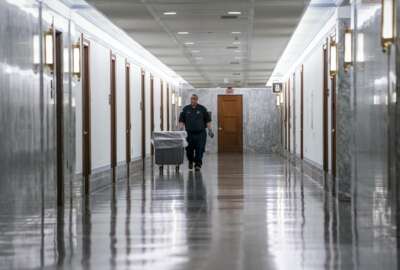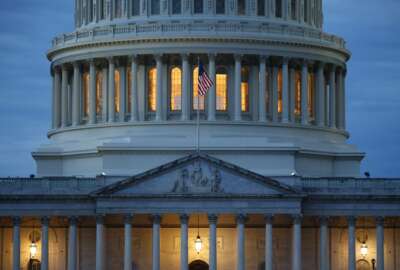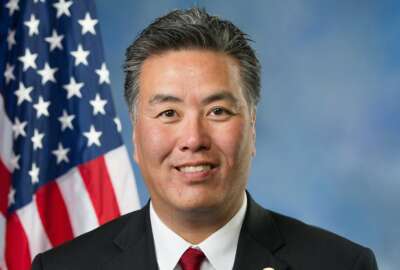
Latest news from Capitol Hill as the coronoavirus situation develops
Communities around the country are starting to ramp up reopen efforts, for better or worse. Just the same, Congress is trying to find its footing again as well.
Best listening experience is on Chrome, Firefox or Safari. Subscribe to Federal Drive’s daily audio interviews on Apple Podcasts or PodcastOne.
A decade before Saturday Night Live, a comedy show called That Was The Week That Was poked fun at politics and culture. Well, on Capitol Hill, they had a week that was. With a recap and what to expect next, Federal Drive with Tom Temin spoke with WTOP capitol hill correspondent Mitchell Miller.
Interview transcript:
Tom Temin: And first of all, Mitchell, tell us about the sign you saw on Capitol Hill, which kind of summed up their attitude these day.
Mitchell Miller: Well, it’s a feeling that everybody has around here. And it’s really funny. It actually just said, “this week has been quite a year.”
Tom Temin: Well put, in fact, I was talking to somebod, we had gone to a wedding about three or four months ago, the last gathering before everything hit. It seems like 1000 years ago that this poor couple got married.
Mitchell Miller: Exactly.
Tom Temin: Anyway, some of the law enforcement legislation under consideration includes federal and not just local police.
Mitchell Miller: That’s right. What we’re going to be looking at this is how this will proceed in the Senate. The Senate Judiciary Committee, headed by Senator Lindsey Graham is going to be taking a look at a lot of the proposals that have been prepared by Senator Tim Scott of South Carolina who has been appointed, basically by Senate Majority Leader Mitch McConnell to get the republicans proposals together the House Judiciary, Republicans are also preparing their plans. And then of course, the House Democrats had already put their sweeping proposal A while back. So all of these things now moving forward, we’ll see where it all settles, but among the proposals related to federal officials, is one related to legislation that was actually originally proposed by DC Delegate Eleanor Holmes Norton and Virginia congressman Don buyer, which requires that federal law enforcement officers have body cameras, as well as dashboard cameras. And this bill had kind of languished a while obviously, all of the events of the last several weeks I’ve really pushed things forward. So it looks like that’s going to be that is included in the Democrats. legislation, we’ll have to see where the areas of agreement are with Republicans and Democrats. Unlike on some of the other issues in the past, like with gun control, there does seem to be a meeting of the minds on several of the issues that both sides are talking about House Minority Leader, Kevin McCarthy last week signaled that he is okay with some of the proposals in the democratic legislation. So unlike in other situations, where you had, for example, during the Coronavirus legislation, where Democrats in the House just decided to pass this massive bill and the Republicans said they’d have nothing to do with it. It now does look like they are trying to forge some areas of agreement. It’s just a matter of what they’re actually going to do in terms of are they going to pass a huge house bill, and then try to get all the things together related to the House Republicans and the Democrats before it goes to the Senate? Are they going to try to bring some of these things together as it moves forward?
Tom Temin: Is there any administration take on yes or no with respect to the federal police having cameras and so on.
Mitchell Miller: Well, right now there’s a lot of wait and see, frankly, among the lawmakers, including Republicans who have really been trying to get more signals from the White House, the White House has indicated that it’s going to come out with these various executive orders. But really there’s a wait for guidance on what President Trump is really going to go along with. There’s been some indication, for example, on various issues like the choke hold a ban on the choke hold Kevin McCarthy, the Republican leader in the House said that he would be not opposed to that. That’s kind of a big one, obviously, in light of what happened with George Floyd and of course, we had the testimony last week from Philonise Floyd, the brother of George Floyd, very passionate testimony, he actually went up to House Speaker Nancy Pelosi and asked her specifically is this going to get done and she says she made a pledge to him that it would get done and that the death of his brother George Floyd would not be in vain.
Tom Temin: We’re speaking with wt o p, Capitol Hill correspondent Mitchell Miller, and then the military is coming under a lot of attention. It probably wishes it didn’t have. But with respect to the renaming of bases that now have those of Confederate generals, Confederate leaders, it seems like the military is at odds with the White House on this, but more in line with what Capitol Hill seems to want, which is to compel these changes.
Mitchell Miller: Yeah, this is one where the republicans are really stepping up on the Senate side and basically, not going along with the president, which is a rare case, as we know, these days. The Senate Armed Services Committee, basically, in a voice vote, saying that they would approve. Senator Tim Kaine of Virginia’s proposal that would restrict the military from actually being allowed to be put into protest cases which Senator Kaine I spoke to him and he was very upset with what happened at Lafayette Square a few weeks ago, indicated that he thought that the military should have nothing to do with what was going on with what he said and many democrats and some Republicans had said, was a very peaceful protest and then you also have an Another big decision from the Senate Armed Services Committee, which is related to naming Confederate bases. Many of these bases, of course, have names going many, many years back. But the armed services committee says they want to basically phase in changes for all of these facilities would probably take over three years, there are probably going to be some counter proposals that might even speed that up. But that’s going to certainly be at loggerheads with the white house because President Trump has made it very clear he does not want to see any of those bases names changed.
Tom Temin: And through all of this, we’ve almost forgotten that there’s a pandemic going on. And there was some at least at least some maybe more on the Democratic side than the Republican, some tendency to want to do the next bill for coronavirus and pandemic. Where does that all stand?
Mitchell Miller: Well. There’s been a drumbeat on the Senate floor from Senate Minority Leader Chuck Schumer who basically every day is going on the floor that he can and urging Senate Majority Leader Mitch McConnell to do something his target date has been before the Fourth of July break for Congress. But it really doesn’t look like it’s going to happen right now unless something really speeds up. And of course, all of these events related to the racial tensions and the death of George Floyd have really changed the scheduling and the calendar of the Senate. And of course, it was already rocked by everything that happened with the pandemic. So a lot of these things I was talking with Virginia Senator Mark Warner last week, and he indicated he still thinks there are things that are on track. He’s still working on a variety of things related to helping with small businesses. That’s been an area as we’ve talked about, where there’s been a lot of bipartisan agreement, but it does look like that whole movement toward a major bill related to the pandemic has slowed down quite a bit. I think they are going to try to get something together. Sometime later this summer. There’s been talk at times with the House Speaker Pelosi and others. Are you able to maybe take a part of what you proposed this big bill The Democrats proposed several weeks ago? But that doesn’t seem like it’s really happened. There hasn’t been a lot of breaking things out. So aside from agreement on the paycheck protection program, they still have a lot of ways to go. Republicans still say, Let’s wait to see for this money to get into the system and whether it’s really working or not.
Tom Temin: Yes, because the favorable looking employment numbers, they may not be great relative to what they were a year ago, but they sure are better than what they were two months ago. That seems to be blunting maybe some of the momentum for a huge stimulus insert.
Mitchell Miller: Absolutely. That was a real stunner. I mean, even the President’s most ardent supporters were really surprised by those figures. And of course, the president touted those and I think it surprised a lot of Democrats, too many of them have, of course, been talking a lot about getting state and local funding for all of these governments that are really struggling and wondering whether they’re going to have to lay off people on first responders and that type of thing, but I think you’re right that really did kind of take a pause, as the republicans have said for a moment to say, Okay, well what is happening with the reopening of the country now with the economy. Now on the flip side, as we’ve seen over the last few days, some of these numbers are trending upward in many of the states that reopen Florida, Georgia, North and South Carolina, Texas. Many of these states that have reopened for the last several weeks, those numbers have been going up. So we’ll have to see how that impacts the dynamic of what’s going on here in Congress.
Tom Temin: And briefly, any major confirmations coming up in the senate?
Mitchell Miller: Right now they’re moving forward on a variety of judicial nominations, as you might imagine. And then of course, the the big one for the Senate, a lot of them are talking about is something that’s really separate from all these crisis, legislative pieces, if you will, and that’s the great outdoors act which they want to get through, which would provide basically the largest amount of money for national parks and for backlog of maintenance in decades that’s been a big one for Republicans and Democrats and it’s one of those few issues where lawmakers from both sides of the aisle are really in agreement that they want to get that move forward.
Tom Temin: Mitchell Miller is Capitol Hill correspondent for WTOP. As always, thanks so much.
Mitchell Miller: You bet.
Copyright © 2025 Federal News Network. All rights reserved. This website is not intended for users located within the European Economic Area.
Tom Temin is host of the Federal Drive and has been providing insight on federal technology and management issues for more than 30 years.
Follow @tteminWFED





